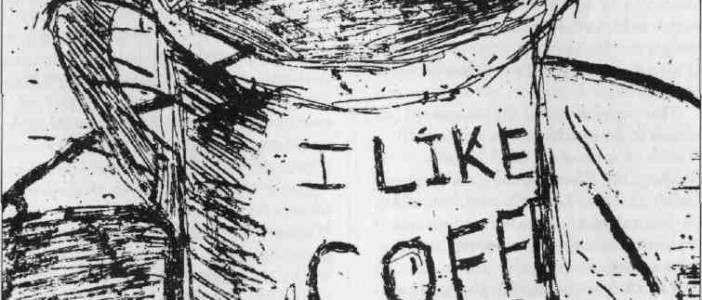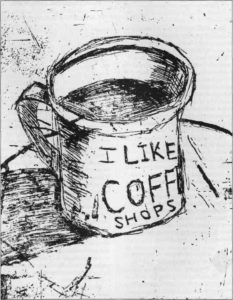
Polishing Ground Level
By Jenny Stahr '02
Nonfiction
Writing Objective: Write an essay in the tradition of Montainge, Orwell, and Dillard
Her name was Olive, and she lived in be 103. She was great-great-great-grandma, and I got to known her. I remember sitting in the sticky orange chair beside her bed. The cracked vinyl itched my skin, and a button on the seat jabbed me if I didn’t sit with my feet turned in. And in between the chair and bed, a little wicker table balanced a glass jar stuffed full of candies dressed up like strawberries. I wish I could remember Grandma’s face, but I can’t.
Mom doubts that I can remember our visits at all—and it is true that Olive died when I was six. But if I were to fabricate memories of her. I would piece together a recollection of her smile or the feeling of her hand on mine or the favorite story of her childhood. Her photos prove that she had a wide, sweet smile. And since they say she was a farm wife, I imagine her hands were spotted with age, but sill calloused and scarred. They say she told of playing with Indian girls on the west bank of the Des Moines River, but I hear this from Grandpa, not Olive. And so it’s farther and farther away from me.
I think of this now. a decade later, as I shuffle down the south wing of the Evangelical Free Nursing Home. It’s my big humanitarian effort for the summer, and it’s no coincidence that I called Olive’s old home. Mom doesn’t remember what room Olive had. so as I walk, my eyes dart left and right, searching for something familiar. Any of these rooms could have been it.
I sigh when I reach the end of the hall without a shiver of recollection. The last door is closed, winged butterflies of construction paper pinned to the wood. The blue one reads “Gen” and the yellow one reads “Marilyn.” Both flap their wings when I knock and the door shakes itself open. Silence. I hesitate, bringing up I he damp piece of paper in the palm of my hand. I check the names for the twelfth or maybe the twentieth time. “Marilyn? Gen? Um, I’m Jenny…a new volunteer here. Can I come in?”
Nothing. I swallow hard and edge inside and blink away the darkness. Just before I see. I hear, and the sounds float on silence: whispers from the one leaning in the wheelchair and whimpers from the pile on the bed. The whisper grows into a murmur as if she’s suddenly speaking to me, but she doesn’t look up. The quilts and afghans on the bed twist a little, and I only see a tuft of pale hah- poking up from the far end of the heap.
“Marilyn’s her name, but she don’t hear it. She don’t see me either, probably, but here I sit. Not like I’ve got somewhere else to be.’ And the woman in the wheelchair reaches out and pats the tangle of white hair. “This old thing’s been my roommate for the last three months. Her sons aren’t here to see her off, so that’s mine to do, I guess. And, oh, it’s a terrible burden, ‘specially when I think of Tom and Reggie. If they don’t show me off. that’ll hurt terribly.”
I stand beside her. blinking.
“I don’t think I’m too far from it,” she goes on. her tiny voice cracking as it gets louder. “But haven’t I been saying it for years. Still, the good Lord let me be, and maybe to watch out for the Marilyns of this world. Who know s. and I don’t mind besides, I say. Just keep me away from that second floor.”
It’s my first day on the job, but I already know about the second floor. The Alzheimer’s patients live up there, and they’re otherwise called The Purse Ladies. No one knows how the trend got started. Men and women alike carry around their “handbags, which range from paper sacks to little purses of beads and sequins. The contents vary from person to person, of course, but there’s always a wallet crammed in among runaway pairs of underwear, Christmas ornaments, and wadded up tissues. The wallet is sometimes empty and sometimes packed full of photos. The sad thing is. empty or full, it doesn’t matter. Tommy who started preschool last year and has Grandpa s dimples doesn’t carry any more significance than the empty plastic pocket. But when it comes down to it, Tommy’s never met his Grandpa, anyway, because the folks stay away.
Gen and Marilyn live on the first floor, but somehow Marilyn’s children, all four- of them, keep away just the same. The Purse Ladies come down for every meal as well as for the afternoon tea, and the other residents despise them because they’re afraid of joining I their ranks. A narrow elevator connects their worlds for now. and that’s guarded by a tree trunk of a man in white named Larry.
Gen mourns his presence. She wheels backward to find comfort in a double frame bearing boyhood photos of Tom and Reggie. “My boys get a bad feeling from his direction just like I do,” she explains. I bite my lip as I remember the manager telling me just 15 minutes before that there isn’t an address to reach Marilyn’s children. And Gen’s Tom and Reggie live in town but haven’t visited the home in four years.
“I’m sure you won’t go up there,” I say, nodding towards the ceiling. She lowers the pictures to her lap and bends over, scrutinizing the images. The room is too dark—the tins window’s blinds are snapped shut. My eyes wander the room, but find that shadows dull every edge and corner, and I turn my ears instead lo Marilyn and notice that the whimpering is gone. I wonder if she’s dead. I shudder and without a word step behind Gen and wheel her out of the room. She doesn’t say a word. As we pass her bed on the way out. she quietly reaches out to leave her sons behind.
Three o’clock and time for tea. Gen hums to herself as I shuffle, and she rolls. A line of The Purse Ladies marches behind us, and I walk faster to miss them, and I feel guilty and relieved when we turn the corner and the dining room spreads out bright and shining in front of us. A cup of lukewarm coffee and a graham cracker for Gen and a gingersnap cookie for me. We sit down at a corner table.
“Sailors.” she offers, and I look up. relieved to have a new topic of conversation. “If I miss one thing in the world, it’s sailors. Them and a swirl cone from the Dairy Stripe. Tell me. honey, you ever stop down to the Dairy Stripe?” I shake my head. “Oh, well, honey. When I was 19 or 20. that year my brothers shipped out to fight Hitler. Know what I did one night after they were all asleep? I got up naked in front of the picture window and danced. Oh, and the sailors saw that and never again did I lack for a swirl cone.”
I choke down my gingersnap. Just as I start to recover, Gen winks at me and I choke again. She cackles and her thick face crinkles into a million folds, her fuzzy gray hair falling back. Just then a Purse Lady hears the commotion and hobbles over to sit with us. We eye her—it’s like junior high when the girl with the wrong pair of jeans tries to find a place at the popular table at lunch. Except that she wears flannel pajamas with an old-fashioned lace scarf tied around her neck. She smiles shyly and lifts up her cup of tea as if to offer us a toast. “I’m Lois and pleased to know you,” she chirps, “And how are you named?
Gen doesn’t answer, instead of raising the cup of coffee to her mouth. She points out her pinky finger as a joke. I give Gen a stern look, and she rolls her eyes but gradually softens into a smile. She smiles at Lois, too, for my sake, and I feel a tingle to know I hat we have a start of some sort of friendship. I turn back to Lois. “I’m Jenny. I’m just visiting. She abruptly leans in, slating alme. Just as I’m about to look away, she throws up both arms with a veil. “I know you! You used to come here visiting when you were just a wisp of a girl. Yes, I certainly do remember you.”
“My Grandma Olive.” I murmur. “You knew her? You remember me?” And I’m desperately trying to lodge this Purse Lady somewhere in my memory. Did she lives across the hall from Olive? Was that it? In a moment. much too quickly, I promise myself that Lois didn’t start out on the second floor. She must be the one I remember seeing from the sticky orange chair. She would watch me from her bed and blow kisses.
“Heavens, yes,” she nods. “I suppose I know most everybody who conies and goes here. I teach school just down the road, you see, and I watch them all grow up, all the little boys and girls. I remember you winning that spelling bee last October with D-A-F-F-O-D-l-L. Of course, I do. In Fact, I have pictorials of all my students just inside my wallet here.” She brings her purse up from her lap and slams it down on the table between us.
She fumbles with the clasp for a couple of minutes, and I just watch, willing my hands to reach out and help her. but they remain clenched in a ball against my chest. Again I try to imagine the touch of Olive’s hand on mine as Lois suddenly forgets the clasp. Again Lois raises her cup high in the air as if in triumph.

“Cup of Coffee” by Joe Cory